
Eleanor Antin is an American performance artist, film-maker, installation artist, conceptual artist, feminist artist, and university professor.
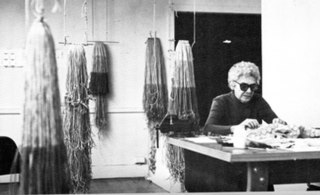
Claire Zeisler was an American fiber artist who expanded the expressive qualities of knotted and braided threads, pioneering large-scale freestanding sculptures in this medium. Throughout her career Zeisler sought to create "large, strong, single images" with fiber.
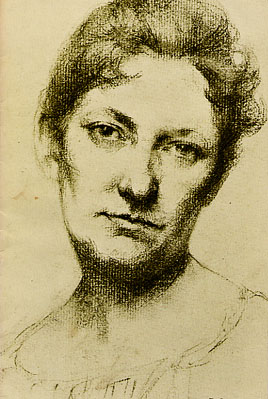
Minerva Josephine Chapman (1858–1947) was an American painter. She was known for her work in miniature portraiture, landscape, and still life.
Eda Nemoede Casterton was an American painter known specifically for her portrait miniatures in watercolor, pastels and oil. She exhibited works at the Paris Salon and the San Francisco Panama–Pacific International Exposition of 1915, among others. Her works are at the Smithsonian American Art Museum and the Brooklyn Museum.
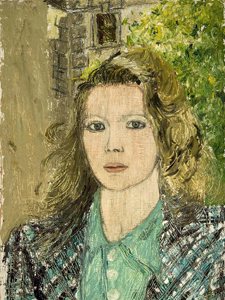
Sylvia Sleigh was a Welsh-born naturalised American realist painter who lived and worked in New York City. She is known for her role in the feminist art movement and especially for reversing traditional gender roles in her paintings of nude men, often using conventional female poses from historical paintings by male artists like Diego Vélazquez, Titian, and Jean-Auguste-Dominique Ingres. Her most well-known subjects were art critics, feminist artists, and her husband, Lawrence Alloway.
Idelle Lois Weber was an American artist most closely aligned with the Pop art and Photorealist movements.
Michelle Grabner is an artist, curator, and critic based in Wisconsin. She is the Crown Family Professor of Art at the School of the Art Institute of Chicago where she has taught since 1996. She has curated several important exhibitions, including the 2014 Whitney Biennial at the Whitney Museum of American Art along with Anthony Elms and Stuart Comer, and FRONT International, the 2016 Portland Biennial at the Oregon Contemporary, a triennial exhibition in Cleveland, Ohio in 2018. In 2014, Grabner was named one of the 100 most powerful women in art and in 2019, she was named a 2019 National Academy of Design's Academician, a lifetime honor. In 2021, Grabner was named a Guggenheim Fellow by The John Simon Guggenheim Memorial Foundation.

M. Jean McLane, was an American portraitist. Her works were exhibited and won awards in the United States and in Europe. She made portrait paintings of women and children. McLane also made portrait paintings of a Greek and Australian Premiers and Elisabeth, Queen of the Belgians.
Harmony Hammond is an American artist, activist, curator, and writer. She was a prominent figure in the founding of the feminist art movement in 1970s New York.
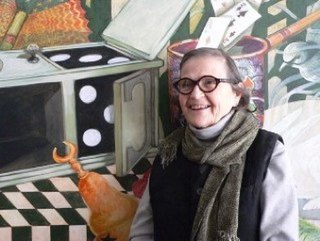
Ellen Lanyon was a painter and printmaker from Chicago, Illinois. She received her BFA from the School of the Art Institute of Chicago (SAIC), her MFA from the University of Iowa School of Art and Art History and studied restoration at the Courtauld Institute of Art. She also received an honorary doctorate from SAIC. Her works are in the permanent collections of many major American museums, including the Art Institute of Chicago, the Museum of Contemporary Art Chicago, the Metropolitan Museum of Art, the Smithsonian American Art Museum, and the Ulrich Museum.

Enella Benedict was an American realism and landscape painter. She taught at the School of the Art Institute of Chicago and was a founder and director for nearly 50 years for the Art School at the Hull House.
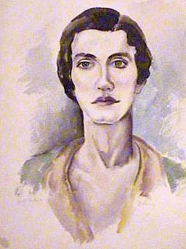
Natalie Smith Henry (January 4, 1907 – February 20, 1992) was an American artist who worked mostly in Chicago. She is best known for her Depression-era post office murals commissioned by the United States Department of the Treasury.
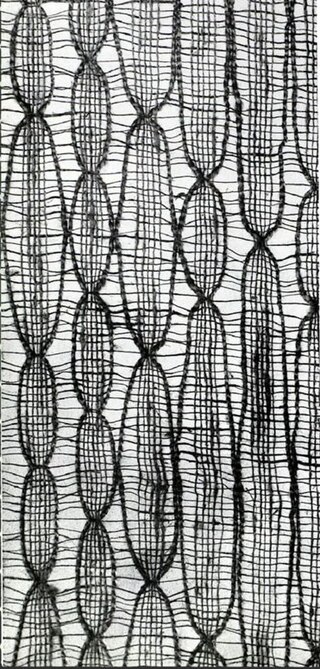
Kay Sekimachi is an American fiber artist and weaver, best known for her three-dimensional woven monofilament hangings as well as her intricate baskets and bowls.
Mary Hortense Webster (1881–1965) was an American sculptor.
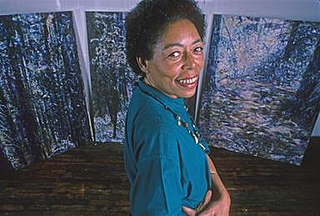
Vivian E. Browne was an American artist. Born in Laurel, Florida, Browne was mostly known for her painting series called Little Men and her Africa series. She is also known for linking abstraction to nature in her tree paintings and in a series of abstract works made with layers of silk that were influenced by her travels to China. She was an activist, professor, and has received multiple awards for her work. According to her mother, Browne died at age 64 from bladder cancer.
Michi Itami is a Japanese-American visual artist. Her work includes printmaking, painting, ceramics and digital art and has been exhibited internationally. She has had solo exhibitions at A.I.R. Gallery, New York; 2221 Gallery in New Delhi, India; Shinsegae Gallery in Seoul, Korea; Beni Gallery in Kyoto, Japan, among others. In 2004 Itami was awarded a Lifetime Achievement Award from the Woman's Caucus on Art. She taught at the San Francisco Art Institute and at California State University, Hayward, and is Professor Emerita at City University of New York where she taught for over 20 years. Itami received a BA in English Literature from UCLA in 1959; later studied at Columbia University in New York where she performed graduate work from 1959 to 1962 in Japanese and English literature, later receiving a MA degree in 1971 from the University of California Berkeley. She was a member of Godzilla, an Asian American arts advocacy group.
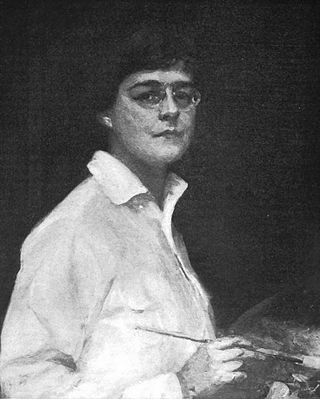
Harriet Blackstone was an American figure and portrait painter. Many of her subjects were midwestern business leaders and their families she also painted a number of prominent musicians.
Muriel Magenta née Zimmerman is an American visual artist working in new media genres of computer art, installation, multimedia performance as well as video and sculpture. Magenta is Professor of Art at Arizona State University.
Ruth Weisberg is an American artist and Professor of Fine Arts at the University of Southern California, where she is also former dean of the USC Roski School of Art and Design. Weisberg's work is influenced by her Jewish heritage and its traditions, the human body, and feminist themes. She works primarily in painting, and her recent work is produced in scroll formats.
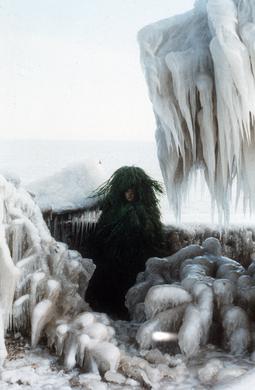
Fern Shaffer is an American painter, performance artist, lecturer and environmental advocate. Her work arose in conjunction with an emerging Ecofeminism movement that brought together environmentalism, feminist values and spirituality to address shared concern for the Earth and all forms of life. She first gained widespread recognition for a four-part, shamanistic performance cycle, created in collaboration with photographer Othello Anderson in 1985. Writer and critic Suzi Gablik praised their work for its rejection of the technocratic, rationalizing mindset of modernity, in favor of communion with magic, the mysterious and primordial, and the soul. Gablik featured Shaffer's Winter Solstice (1985) as the cover art for her influential book, The Reenchantment of Art, and wrote that the ritual opened "a lost sense of oneness with nature and an acute awareness of ecosystem" that offered "a possible basis for reharmonizing our out-of-balance relationship with nature."












